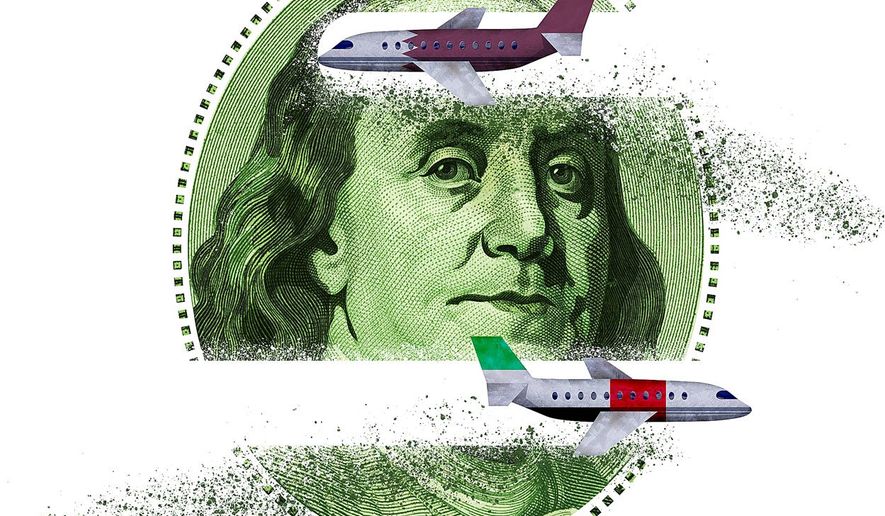OPINION:
Last month, President Trump laid out his foreign policy doctrine in a speech that emphasized economic security as a key piece of America’s national security policy. He called for “trade based on the principles of fairness and reciprocity” and “firm action against unfair trade practices.”
The administration has already correctly identified one of the most rampant trade abuses our country faces: relentless trade-cheating by Middle Eastern countries that violate their Open Skies agreements. Now, it must ensure that more than a million American jobs are not threatened due to the actions of these countries.
The United Arab Emirates (UAE) and Qatar blatantly violated their agreements with the U.S. by providing their state-owned airlines — Emirates, Etihad Airways and Qatar Airways — with over $50 billion in government subsidies. Open Skies agreements are bilateral treaties that the U.S. enters into with other countries to allow airlines from both countries to fly back and forth without restrictions.
The United States has these agreements with over 120 countries around the world, nearly all of which are being followed and enforced as written. There are only two countries that are violating them and threatening American jobs: the UAE and Qatar.
When I served as secretary of Transportation during the Reagan administration, the president understood that the United States’ economic and national security were inextricably linked, and his policies reflected that. Mr. Trump’s vision for America’s foreign policy in 2017 is similar to what President Reagan’s was in 1987: one that promotes free markets and American businesses abroad, while preserving fair and open trade that protects American workers.
The Gulf airlines’ billions in unfair government subsidies infringe upon these principles. They massively skew the international aviation market, making it harder for U.S. airlines to compete on a level playing field.
By not facing the same market pressures as their global competitors, the Gulf carriers have been able to expand the number of routes they fly and the frequency with which they fly them without any regard for consumer demand. U.S. airlines have struggled to compete with the artificially low prices and have been forced out of markets as a result. For example, U.S. airlines have cut back on non-stop flights to India because they do not have the massive subsidies propping them up that the Gulf airlines do.
The U.S. aviation industry supports over 1.2 million American jobs that are threatened by every trade-cheating action taken by the Gulf carriers and their government sponsors. When a U.S. airline has to end a route because a Gulf airline takes it over, 1,500 American jobs are lost. Not only does this hurt airline workers and their families, but also the communities where they live and the local businesses they support.
The subsidies pose a far bigger threat to the U.S. economy than just a few additional foreign airline routes here and there. Our government must enforce our Open Skies agreements and end these practices at once.
U.S. airline employees have received broad support for this cause. Over 310 current members of Congress have written letters to Secretary of State Rex Tillerson, Secretary of Commerce Wilbur Ross and Secretary of Transportation Elaine Chao calling on the administration to enforce our Open Skies agreements with the UAE and Qatar. This is in addition to numerous state and local business leaders who have done the same with the recognition that continued Gulf airline subsidies will lead to harmful effects for their local economies.
In his first year alone, Mr. Trump has taken on the UAE, Qatar and their subsidized airlines in order to protect American workers and their jobs. This act of leadership was sorely needed after years of delay, fumbling and inaction by the Obama administration. The Trump administration’s work to address these trade violations against the United States is consistent with Mr. Reagan’s policies promoting free, but fair, trade.
• James H. Burnley IV was the U.S. secretary of Transportation under President Ronald Reagan. He is a partner at Venable LLP and an adviser to American Airlines.




Please read our comment policy before commenting.